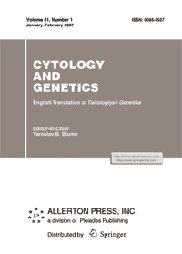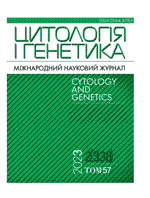З огляду на те, що Україна є потужним експортером кукурудзи в світі, скринінг піддатливих до генетичної трансформації генотипів, що культивуються на її теренах, та створення ефективної технології трансформації української кукурудзи є актуальним. Прекультивовані незрілі зародки кукурудзи дев’яти генотипів (інбредні лінії та гібриди) піддавали Agrobacterium-опосередкованій трансформації. У роботі використовували три штами A. tumefaciens та три векторні конструкції, які містили селективний маркерний ген неоміцинфосфотрансферази II, а також репортерні гени зеленого флуоресціюючого протеїну або β-глюкуронідази. Трансгенні рослини відбирали на живильних середовищах із паромоміцином. На селективних середовищах для шести генотипів спостерігали регенерацію пагонів після трансформації. Методом ПЛР виявлено присутність трансгенів у 43 клонах, отриманих від чотирьох генотипів із використанням усіх наявних векторів. Частота трансформації варіювала від 0 до 27 % в окремих експериментах. Знайдено сильну кореляцію між частотами регенерації та трансформації. Виявлено значущу різницю у частоті регенерації та трансформації між генотипами та рослинами одного генотипу, які були донорами експлантів. Використання вектора рСВ271, який містив нуклеотидні послідовності регуляції експресії генів однодольних перед селективним маркерним геном, а саме інтрон гена hsp70 кукурудзи, достовірно збільшувало частоту регенерації пагонів після трансформації. Аналіз рослин покоління Т1 виявив однолокусне вбудовування трансгенів у рослинний геном. Запропонований протокол генетичної трансформації з використанням паромоміцину як селективного агенту є ефективним для отримання трансгенної кукурудзи ліній та гібридів української селекції. Відібрано три генотипи (лінія ДК232 та гібриди КП7×ПРЖ5 і КС277×RS15) як найбільш сприйнятливі до Agrobacterium-опосередкованої трансформації і перспективні для подальших досліджень з отримання трансгенних рослин кукурудзи.
Ключові слова: Zea mays L., nptII, S65Tpgfp, uidA, паромоміцин, трансгенна кукурудза, покоління Т1

Цитована література
Anami, S., Njuguna, E., Coussens, G., et al., Higher plant transformation: principles and molecular tools, Int. J. Dev. Biol., 2013, vol. 57, pp. 483–494. https://doi.org/10.1387/ijdb.130232mv
Ewens, W.J. and Brumberg, K., Introductory Statistics for Data Analysis, Cham: Springer-Verlag, 2023, vol. 273. https://doi.org/10.1007/978-3-031-28189-1
Fedorenko, T., Markovskiy, O., Vlasova, O., et al., Detection of resistant to glyphosate maize transformation events GA21, MON88017 and NK603 among Ukrainian market samples, In Vitro Cell. Dev. Biol., 2012, vol. 48, p. 76.
Gerasymenko, I.M., Sheludko, Y.V., Klebanovych, A.A., et al., Comparison of effectiveness of 5′-regulatory sequences in transplastomic tobacco chloroplasts, Transgenic Res., 2017, vol. 26, no. 1, pp. 65–75. https://doi.org/10.1007/s11248-016-9980-2
Grimsley, N., Hohn, T., Davies, J.W., et al., Agrobacterium-mediated delivery of infectious maize streak virus into maize plants, Nature, 1987, vol. 325, pp. 177–179. https://doi.org/10.1038/325177a0
ISAAA. Global status of commercialized biotech/GM crops in 2019, Ithaca, New York: Int. Serv. Acquis. Agribiotech. Appl., 2020. https://www.isaaa.org/resources/publications/briefs/55/default.asp.
Ishida, Y., Saito, H., Ohta, S., et al., High efficiency transformation of maize (Zea mays L.) mediated by Agrobacterium tumefaciens, Nat. Biotechnol., 1996, vol. 14, no. 6, pp. 745–750. https://doi.org/10.1038/nbt0696-745
Ishida, Y., Hiei, Y., and Komari, T., Agrobacterium-mediated transformation of maize, Nat. Protoc., 2007, vol. 2, no. 7, pp. 1614–1621. https://doi.org/10.1038/nprot.2007.241
Jefferson, R.A., Assaying chimeric genes in plants: The GUS gene fusion system, Plant Mol. Biol. Rep., 1987, vol. 5, pp. 387–405. https://doi.org/10.1007/BF02667740
Kausch, A.P., Nelson-Vasilchik, K., Tilelli, M., et al., Maize tissue culture, transformation, and genome editing, In Vitro Cell. Dev. Biol., 2021a, vol. 2, pp. 1–9. https://doi.org/10.1007/s11627-021-10196-y
Kausch, A.P., Wang, K., Kaeppler, H.F., et al., Maize transformation: history, progress, and perspectives, Mol. Breed., 2021b, vol. 41, p. 38. https://doi.org/10.1007/s11032-021-01225-0
Klein, T.M., Fromm, M., Weissinger, A., et al., Transfer of foreign genes into intact maize cells with high-velocity microprojectiles, Proc. Natl. Acad. Sci. U. S. A., 1988, vol. 85, no. 12, pp. 4305–4309. https://doi.org/10.1073/pnas.85.12.4305
Koncz, C. and Schell, J., The promoter of TL-DNA gene 5 controls the tissue-specific expression of chimaeric genes carried by a novel type of Agrobacterium binary vector, Mol. Gen. Genet., 1986, vol. 204, pp. 383–396. https://doi.org/10.1007/BF00331014
Lowe, K., Wu, E., Wang, N., et al., Morphogenic regulators Baby boom and Wuschel improve monocot transformation, Plant Cell., 2016, vol. 28, pp. 1998–2015. https://doi.org/10.1105/tpc.16.00124
Lu, A., Diehn, S., and Cigan, M., Maize protein expression, in Recent Advancements in Gene Expression and Enabling Technologies in Crop Plants, Azhakanandam, K., Silverstone, A., Daniell, H., et al., Eds., New York: Springer-Verlag, 2015, pp. 3–40. https://doi.org/10.1007/978-1-4939-2202-4_1
Masters, A., Kang, M., McCaw, M., et al., Agrobacterium-mediated immature embryo transformation of recalcitrant maize inbred lines using morphogenic genes, JoVE, 2020, vol. 156, p. e60782. https://doi.org/10.3791/60782
McDonald, J.H., Handbook of Biological Statistics, Maryland, Baltimore: Sparky House, 2014. http://www.biostathandbook.com/.
Morel, G. and Wetmore, R.H., Fern callus tissue culture, Am. J. Bot., 1951, vol. 38, no. 2, pp. 141–143. https://doi.org/10.1002/j.1537-2197.1951.tb14804.x
Morgun, B.V., Satarova, T.M., Nitovska, I.O., et al., Ukr. Patent 148028, Byull. Izobret., 2021, no. 26. https://sis.nipo.gov.ua/uk/search/detail/1602283/.
Murashige, T. and Skoog, F., A revised medium for rapid growth and bioassays with tobacco tissue culture, Physiol. Plant., 1962, vol. 15, pp. 473–497. https://doi.org/10.1111/j.1399-3054.1962.tb08052.x
Mykhalska, S.I., Adamenko, N.I., Morgun, B.V., et al., Competence to Agrobacterium–mediated transformation of shoot nodal section segments of corn elite inbread lines, Biotekhnolohiia, 2012, vol. 5, no. 3, pp. 98–105. https://www.biotechnology.kiev.ua/images/BTA/ 2012/3_2012/mykhal3_2012.pdf.
Mykhalska, S.I., Sergeeva, L.E., Matveyeva, A.Yu., et al., The elevation of free proline content in osmotolerant transgenic corn plants with dsRNA suppressor of proline dehydrogenase gene, Plant Physiol. Genet., 2014, vol. 46, no. 6, pp. 482–489. http://nbuv.gov.ua/ UJRN/FBKR_2014_45_6_5 (In Russian).
Nitovska, I.O., Avilov, I.D., and Morgun, B.V., The positive effect of antibiotic paromomycin compared with kanamycin for selection of transgenic plants with nptII gene on the example of Nicotiana tabacum, Fact. Exp. Evol. Org., 2015, vol. 17, pp. 270–273.
Nitovska, I., Vasylenko, M., and Morgun, B., Effect of monocot introns on transgene expression in genus Nicotiana plants, Biotech. Acta, 2018, vol. 11, no. 4, pp. 73–83. https://doi.org/10.15407/biotech11.04.073
Nitovska, I.O., Abraimova, O.Ye., Duplij, V.P., et al., Application of beta-glucuronidase transient expression for selection of maize genotypes competent for genetic transformation, Cytol. Genet., 2019, vol. 53, no. 6, pp. 451–458. https://doi.org/10.3103/S0095452719060082
Nitovska, I.O., Morgun, B.V., Abraimova, O.Ye., et al., Glyphosate selection of maize transformants containing cp4epsps gene, Fact. Exp. Evol. Org., 2020, vol. 26, pp. 239–244. https://doi.org/10.7124/FEEO.v26.1273
O’Kennedy, M.M., Stark, H.C., and Dube, N., Biolistic-mediated transformation protocols for maize and pearl millet using pre-cultured immature zygotic embryos and embryogenic tissue, Methods Mol. Biol., 2011, vol. 710, pp. 343–354. https://doi.org/10.1007/978-1-61737-988-8_23
Omer, R.A., Matheka, J.M., Abdelbagi, A.M., et al., Transformation of tropical maize with the NPK1 gene for drought tolerance, Int. J. Genet. Eng., 2013, vol. 3, pp. 7–14. https://doi.org/10.5923/j.ijge.20130302.01
Rajeevkumar, S., Anunanthini, P., and Sathishkumar, R., Epigenetic silencing in transgenic plants, Front. Plant Sci., 2015, vol. 6, p. 693. https://doi.org/10.3389/fpls.2015.00693
Sidorov, V. and Duncan, D., Agrobacterium-mediated maize transformation: immature embrious versus callus, in Transgenic Maize. Methods and Protocols, Scott, M.P., Ed., Totowa: Humana, 2009, vol. 526, pp. 47–58. https://doi.org/10.1007/978-1-59745-494-0_4
Tishchenko, O.M., Komisarenko, A.G., Mykhalska, S.I., et al., Agrobacterium-mediated transformation of sunflower (Helianthus annuus L.) in vitro and in planta using Lba4404 strain harboring binary vector pBi2E with dsRNA-suppressor of proline dehydrogenase gene, Cytol. Genet., 2014, vol. 48, pp. 218–226. https://doi.org/10.3103/S0095452714040094
USDA. Grain: world markets and trade. March 8, 2024. https://downloads.usda.library.cornell.edu/usda-esmis/files/zs25x844t/hh63vf62k/pc28c528c/grain.pdf
Varchenko, O.I., Kuchuk, M.V., Parii, M.F., et al., Comparison of gfp gene expression levels after Agrobacterium-mediated transient transformation of Nicotiana rustica L. by constructs with different promoter sequences, Cytol. Genet., 2020, vol. 54, no. 6, pp. 531–538. https://doi.org/10.3103/S0095452720060110
Yassitepe, J.E.C.T., da Silva, V.C.H., Hernandes-Lopes, J., et al., Maize transformation: from plant material to the release of genetically modified and edited varieties, Front. Plant Sci., 2021, vol. 12, p. 766702. https://doi.org/10.3389/fpls.2021.766702
